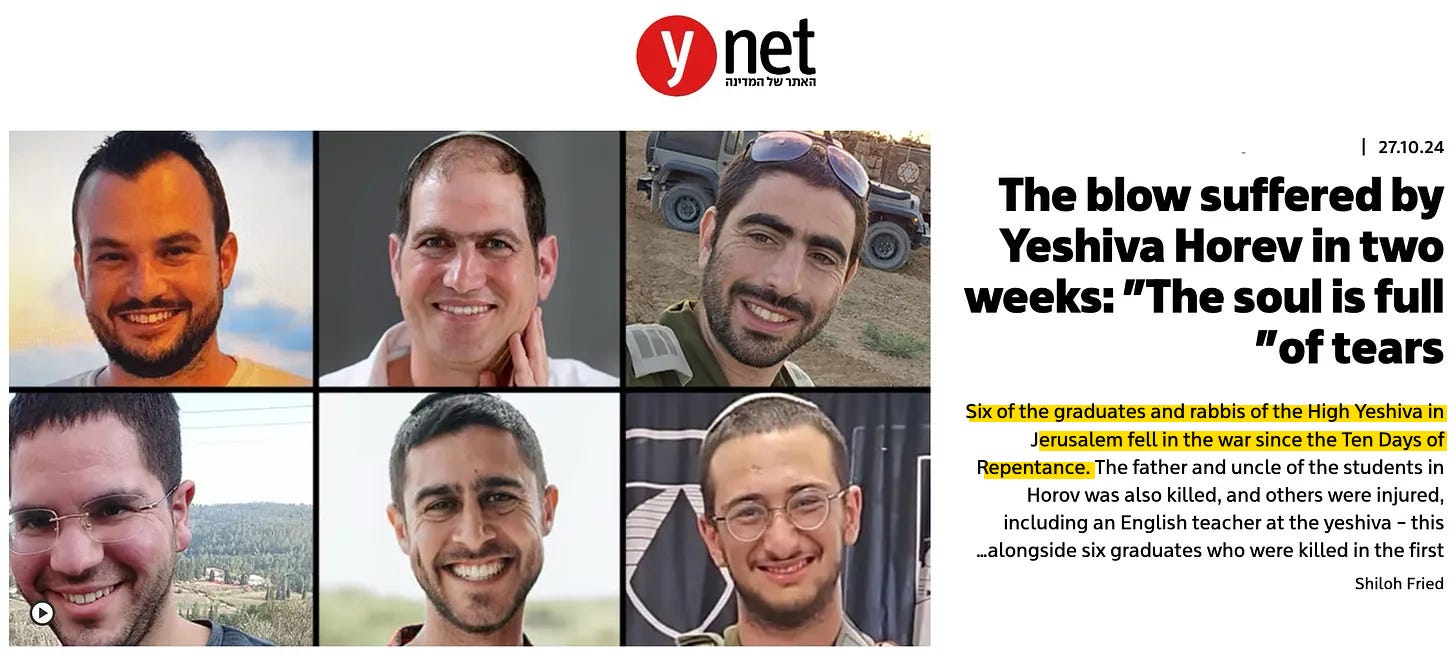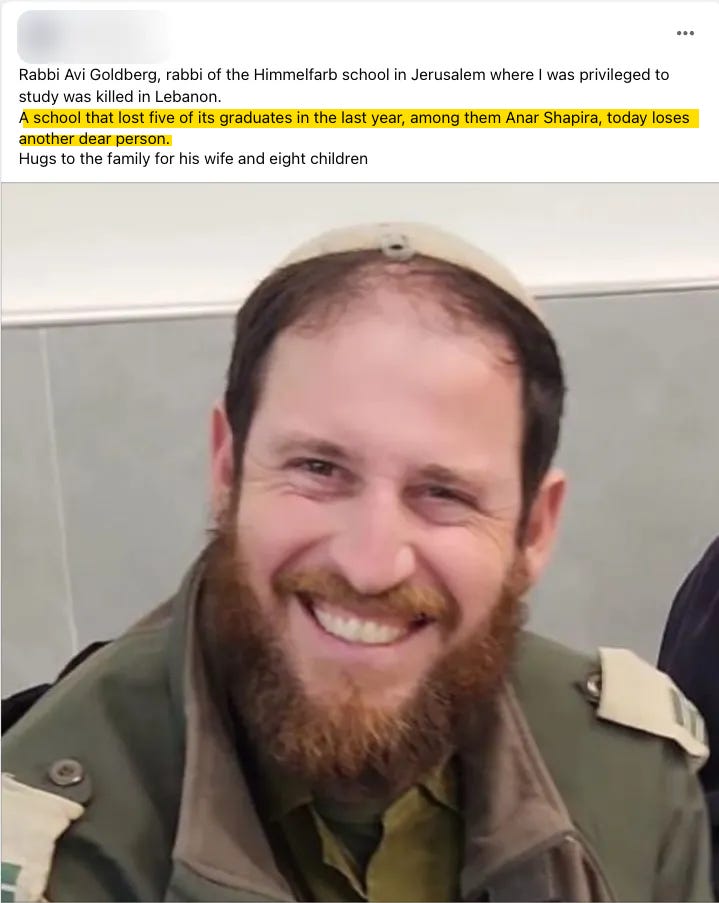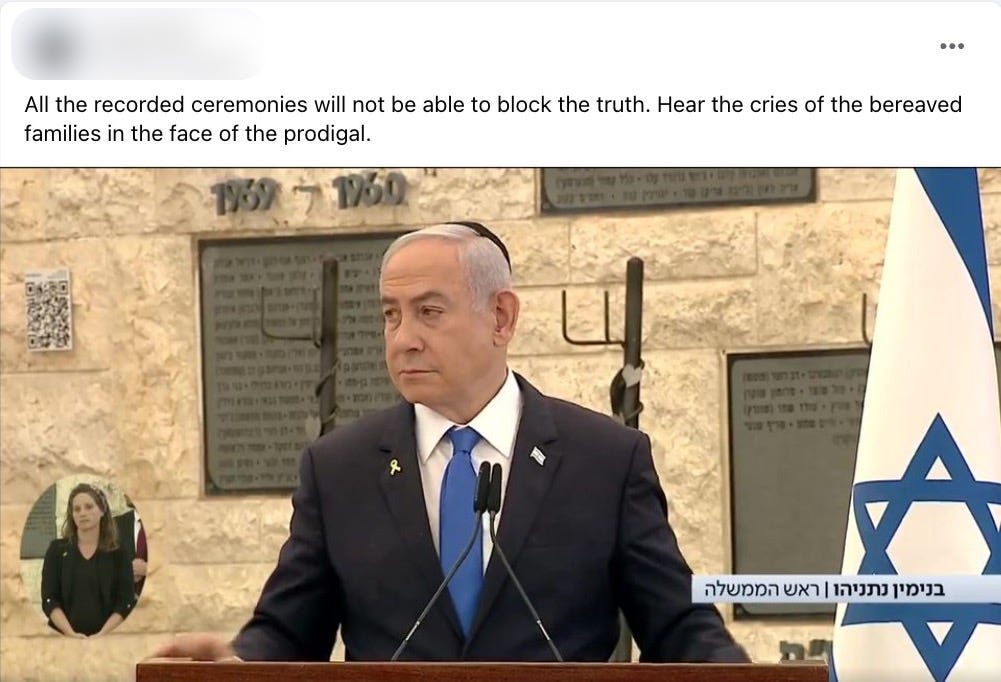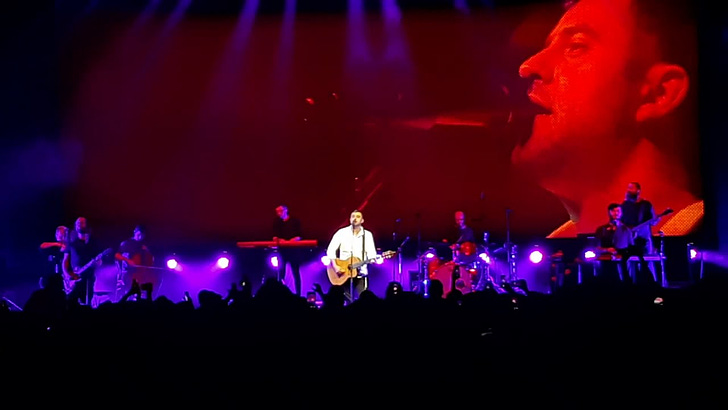We attacked Iran? It’s hard to remember.
The costs of the war in Lebanon (and Gaza) are proving so grievous that the fallen fathers, teachers, principals, rabbis, sons, uncles, brothers and friends are pretty much all anyone in our neck of the woods can think or talk about.
The Horev School is a few minutes’ walk from our house. (English below on the Ynet screenshot is Google translated, but it’s good enough for here.) Six graduates and teachers, from one school, “Since the Ten Days of Repentance.” In other words, in the last few weeks.
Waves of grief and brokenheartedness are lapping at the shores of this neighborhood and community in ways that are impossible to adequately convey.
One would imagine that there couldn’t possibly be another school in more or less the same neighborhood that’s been similarly devastated.
One would imagine incorrectly. There’s also the Himmelfarb School. Another Facebook post (also Google translated):
It’s interesting—and unusual for Israel—that even as the country hemorrhages in the north, there’s not an abundance of backseat drivers. I, at least, hear relatively few people who’re certain as to what we should do. Stop the losses and leave Hezbollah in Southern Lebanon? And in so doing, cede the north as a no-man’s-land to the fear of rockets?
Or keep up the battle, endure more and more loss, and …. what? Hamas is still firing rockets a year later. Are we going to get to the point where residents of the north are really going to return home?
Even there isn’t a ton of Monday morning quarterbacking (obviously, there’s some, including by some very smart people), there is a palpable sense of rage at the government—not for the way the war is going, but for the sense that the PM and a few of the other ministers truly could not care less whether the hostages come home, or, frankly, how the families of the fallen are doing.
At the third, yes, third, national memorial ceremony for October 7 ( don’t ask….), the PM spoke, or tried to. The original plan, apparently, had been to exclude families of the fallen, because of the outbursts that were feared. Then, in response to an outburst about that, some representatives of the fallen were included, so then, the outbursts of rage, anguish and despair followed—precisely as predicted.
Here’s what one widely admired Israeli figure posted about the event (Google translated):
In the video below, you can hear what’s being referred to above. The PM begins by saying משפחות יקרות, mishpachot yekarot, “beloved families.” That’s pretty much as far as he gets, until (towards the end of this video, not visible to the camera) security personnel clear the protesters from the crowd.
You don’t need to speak a word of Hebrew to understand the video:
Many people did not appreciate what they thought was the PM’s lack of emotion as the protesters were pulled out. One sample is this Facebook response to the video (Google Translated):
I’m not taking a stand on the protesters or the PM’s reaction.
The point here is that this is a country that is starting to drown in grief and rage. We’re bogged down in a war that is more than a year old with no signs that we’re anywhere near the “total victory” the PM and others have promised, with the residents of the north no closer to going home, with Hamas already rebuilding and recruiting in Gaza (in part with money that they get from stealing and then selling humanitarian aid), Hezbollah also regrouping …
while our newsfeed continues to announce the timing of funerals.
Given the sentiments of the past few days, it seems appropriate to revisit the memorial ceremony on October 7th that we’ve posted about a few times, to remind ourselves that were are people here who have been wrestling with horror, not sleeping, tormented by what they say, for more than a year.
There’s tragically nothing new about his heartbreak.
Here’s another clip, this time with a representative of Zaka, the Orthodox volunteers who care for bodies after terror attacks, among other incidents.
You can actually feel the palpable, aching pain of this man, a year after he witnessed October 7.
Also, don’t miss the quick shot of one of the Zaka volunteers putting his arm around another volunteer, who is clearly about to cry (at 1:37).
The song (subtitled added here for our readers) is performed by Shuli Rand and Yishai Levi. Shuli Rand (the first to sing) is a Hassidic Israeli film singer, screenwriter and actor, a member of what is known as the Breslover Hassidim. Yishai Levi, the second to perform, is a well-known Israeli singer, who’s had a complicated career and life that’s included drugs, jail, and great success.
The combination of the two at an evening of commemoration, given the two very different worlds they represent, was obviously no accident.
The song, lyrics by Tami Levi and melody by Moshe Nagar, is Al Nevakesh — “Let’s Not Ask.”
“Let’s not look for what tomorrow will bring.”
How long is this going to go on? What kind of a society will remain—and emerge—when the canons are silenced? Will we unite, or split bitterly once again? Will anyone in power ever take responsibility for the worse catastrophe in the history of this country? Are there going to emerge new leaders, people we’ve barely heard of or not heard of at all, who can not only rebuild, but take us to greater heights?
“Sometimes, we are not allowed to know.”
That is more than a line from a song. Accepting that we have to see this through even though we have no idea what will be when it’s over is the only way to put one foot in front of the other. It’s about rising again each morning with the sun, knowing that if those who came before us had stopped when things got unbearably sad, we wouldn’t be here now to face sorrows that are not new to this country, or to the people it was created to save.




















Welcome to heartbreak hill